Understanding the Different Types of Sperm Extraction

Sperm extraction is a way to overcome male factor infertility. In cases where there’s no sperm present in the ejaculate (azoospermia), our doctors at California Center for Reproductive Health use a variety of techniques to acquire sperm to use in IVF (in vitro fertilization) or ICSI (intracytoplasmic sperm injection).
Azoospermia may be due to a blockage in the male reproductive tract. You can produce sperm, but it can’t get into your semen to fertilize your partner’s egg. In nonobstructive azoospermia, you have little or no sperm production, usually due to defects in your testicles’ function or structure.
We call on the most skilled reproductive urologists from the greater Los Angeles, California, area to perform sperm extraction procedures under local anesthesia.
Conception using extracted sperm
When healthy sperm is successfully extracted from the testes, epididymis, or vas deferens, we use it in one of a few different procedures.
In vitro fertilization (IVF) involves fertilizing mature eggs with sperm in a lab. Once a healthy embryo forms, we place it in the woman’s uterus with hopes of implantation.
During intracytoplasmic sperm injection, a single sperm is injected into the center of a mature egg to create an embryo in a lab. Once the embryo is deemed viable (after one to five days), we implant it into the woman’s uterus for possible implantation and pregnancy.
Types of sperm extraction
The type of sperm extraction you undergo depends on your particular condition.
Testicular sperm aspiration
Testicular sperm aspiration (TESA) is done while you’re under local anesthesia. The procedure is coordinated with egg retrieval from your partner to time it perfectly for IVF or ICSI.
We obtain your sperm by inserting a needle in the testicle to aspirate the sperm. This method is effective for men with obstructive azoospermia (often caused by a vasectomy).
Percutaneous epididymal sperm aspiration
Percutaneous epididymal sperm aspiration (PESA) can be effective for men with obstructive azoospermia due to vasectomy or infection. It involves removing sperm from the epididymis, a tube attached to each testicle where sperm is stored and matures.
This procedure is also timed with egg retrieval for effective IVF.
Testicular sperm extraction
Testicular sperm extraction (TESE), is a bit more invasive that TESA. It involves making a small incision in the testis, so we can examine the tubules for the presence of sperm. We remove small fragments of testicular tissue and isolate any sperm.
This procedure may be timed with egg retrieval, but many patients cryopreserve the sperm during this procedure for future IVF/ICSI.
Microepididymal sperm aspiration
Microepididymal sperm aspiration (MESA) may be recommended if you have obstruction due to vasectomy or due to congenital absence of the vas deferens, an excretory duct of the testes.
Usually, couples choose to cryopreserve sperm acquired through MESA, as it allows for a large collection of mature sperm
Microdissection TESE (microTESE)
MicroTESE is effective when you have a sperm production problem. We coordinate your microTESE the day before your partner’s egg retrieval. Sperm may also be cryopreserved after the procedure.
We often recommend you have donor sperm as a back-up plan just in case no sperm can be retrieved.
At the California Center for Reproductive Health, our team is dedicated to helping you get the family you dream of having. Call one of our offices in Encino, Valencia, Alhambra, or West Hollywood, California to set up an appointment. Alternatively, reach out via this website.
Eliran Mor, MD
Reproductive Endocrinologist located in Encino, Valencia & West Hollywood, CA
FAQ
What does a reproductive endocrinologist and infertility specialist do?
Reproductive endocrinology and Infertility is a sub-specialty of Obstetrics and Gynecology. In addition to managing medical and surgical treatment of disorders of the female reproductive tract, reproductive endocrinologist and infertility (REI) specialists undergo additional years of training to provide fertility treatments using assisted reproductive technology (ART) such as in vitro fertilization.
Reproductive endocrinologists receive board certification by the American Board of Obstetrics and Gynecology in both Obstetrics and Gynecology and Reproductive Endocrinology and Infertility.
When should I see an REI specialist?
In general, patients should consider consulting with an REI specialist after one year of trying unsuccessfully to achieve pregnancy. The chance of conceiving every month is around 20%, therefore after a full year of trying approximately 15% of couples will still not have achieved a pregnancy.
However, if a woman is over the age of 35 it would be reasonable to see a fertility specialist earlier, typically after 6 months of trying.
Other candidates to seek earlier treatment are women who have irregular menses, endometriosis, fibroids, polycystic ovary syndrome (PCOS), women who have had 2 or more miscarriages, or problems with the fallopian tubes (prior ectopic pregnancy).
What are the reasons we are having trouble conceiving?
Approximately 1/3 of the time cause for infertility is a female factor, 1/3 of the time a male factor, and the remaining 1/3 a couples’ factor.
At CCRH, we emphasize the importance of establishing a correct diagnosis. Both partners undergo a comprehensive evaluation including a medical history and physical exam.
Furthremore, the woman’s ovarian reserve is assessed with a pelvic ultrasound and a hormonal profile. A hysterosalpingogram (HSG) will confirm fallopian tube patency and the uterine cavity is free of intracavitary lesions. A semen analysis is also obtained to evaluate for concentration, motility, and morphology of the sperm.
Additional work up is then individualized to direct the best possible treatment option for each couple.
What is IVF? What is the process like?
In vitro fertilization (IVF) is the process that involves fertilization of an egg outside of a woman’s body.
The process starts with fertility drugs prescribed to help stimulate egg development. In your natural cycle, your body is only able to grow one dominant egg, but with stimulation medication we can recruit multiple eggs to continue to grow. After about 8-10 days of stimulation, the eggs are surgically retrieved and then fertilized with sperm in a specialized laboratory. Fertilized eggs are then cultured under a strictly controlled environment within specialized incubators in the IVF laboratory for 3-5 days while they develop as embryos. Finally, embryos (or an embryo) are transferred into the uterine cavity for implantation.
Should I have IVF?
Before deciding if IVF is the right choice, it’s important to sit down with an REI specialist to discuss available treatment options. For some people, other methods such as fertility drugs, intrauterine insemination (IUI) may be the best first choice treatment. At CCRH, we believe each individual couple is unique and not everyone needs IVF.
Is the IVF procedure painful?
While not painful, the fertility medications may some side effects including headaches, hot flashes, mood swings, and bloating. The injection sites may also bruise.
Will IVF guarantee a baby?
Unfortunately, no. Many people think once they start IVF it’s a matter of time that they will be pregnant and have a baby. But according to national statistics per the Society of Assisted Reproduction (SART), on average 40% of assisted reproduction cycles achieve live births in women under age 35. The chances of success then continue to decrease with advancing age.
At CCRH, we employ only evidence-based interventions to ensure patient safety and optimal outcome. While we cannot guarantee a baby, we guarantee that you will receive the best, most advanced, personalized care to help you maximize your chance of a baby.
What is the success rate for IVF?
The average IVF success rate (success measured in live birth rate) using one’s own eggs begins to drop around age 35 and then rapidly after age 40. This is due to the decline in egg quantity and egg quality as a woman ages.
Our clinic’s success rate consistently beats the national average year after year.
Do insurance plans cover infertility treatment? How much does IVF cost?
Individual insurance plans often do not have any coverage for infertility treatments. If you have a group plan, you can call members services to see if they have coverage for infertility (including consultation/workup and IVF).
After your consultation with our REI specialist, one of our dedicated account managers with sit with you to go over the cost of treatment.




